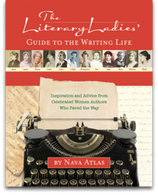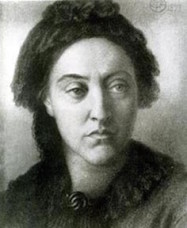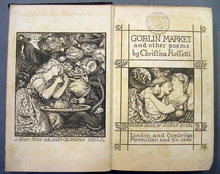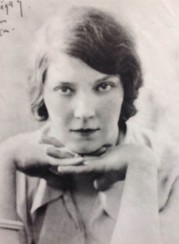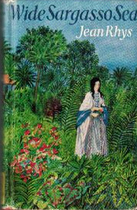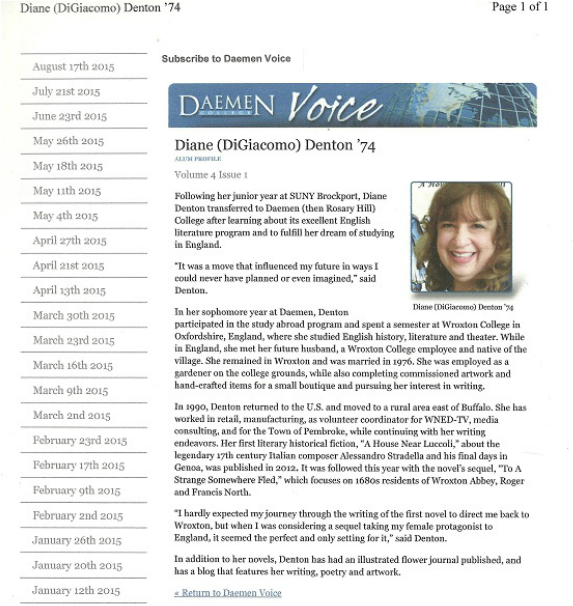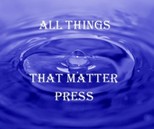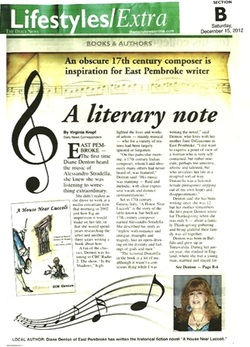Contact and/Sign Up for Publication News
from DM Denton
[Ester Diaz Morillo of the Pre-Raphaelite Society welcomes] D M Denton (Diane) to the podcast to talk about her latest novel The Dove Upon Her Branch: A Novel Portrait of Christina Rossetti. Diane discusses the research processes involved in writing historical novels while trying to convey the true story of a person that has often been overlooked in media adaptions of Pre-Raphaelite stories.

Full-page ad for The Dove Upon Her Branch, A Novel Portrait of Christina Rossetti in the spring 2024 issue of the Pre-Raphaelite Society Review, beautifully created by PRS Review Graphic Designer Charlotte Newman-Casey.
The PRS Review goes out to its worldwide members digitally and in print. Coming up in the summer 2024 issue, a review of The Dove Upon Her Branch.
Literary Ladies GuideNew! Published 9/16/2023.
|
InterviewsInterview at writerchristophfischer, January 2, 2016
Saturday Historical Novelist CF: Are you like any of the characters in your books, and, if so, what are the similarities? DMD: There are autobiographical aspects to the central female fictional protagonist, Donatella, in A House Near Luccoli and its sequel, To A Strange Somewhere Fled. Who better than myself to draw on as I went about characterizing an insecure, isolated, resigned if passionate and creative woman, who is well past her youth and, as it seems, more prepared to meet the mundane than the extraordinary? I readily admit she stepped out of my hopes and disappointments into an unlikely interaction with the colorfully confident Alessandro Stradella, his usual dalliances with women who were enticing and dangerous, the antithesis of Donatella … and me. The sequel, taking her to the very place in England where I lived 300 years later, only made her more of a creature of my experience, observations, secrets and revelations, perhaps, more honestly so, until—to rephrase a line fromWuthering Heights—she became more myself than I am. Read entire interview ... Interview at Layered Pages, August 17, 2015
Historical Fiction & Meaning LP: Why Historical Fiction? DMD: In hindsight, my journey towards writing historical fiction began in my early teens when I developed an insatiable appetite for classic literature, period films and plays, and Renaissance, Baroque, Classical, and traditional music. I’ve long had a fascination with the clothes, customs, social and political issues of the past, and I’m attracted to the lives of writers, artists, musicians, intellectuals, and innovators, but, also, ‘ordinary’ folk like gardeners and domestics. All in all, it’s more comfortable for me to write within a historical context; I feel I can reveal myself and still remain hidden. I can indulge my old-fashioned sensibilities yet still oblige my progressive tendencies, because history isn’t static, somewhere dead in time, but a life force for the present and future. Interview at Unusual Historicals, June 21, 2015
UH: How do you approach developing the world of a historical novel fully in your mind? DMD: It’s not unlike meeting a new lover, feeling the chance of the introduction, instinctively knowing this is someone you want to know better, even intimately; perhaps wondering if it’s a wise or mutual attraction, but in the end deciding—believing—the affair is meant to be. It’s as fortuitous, daunting and magical to encounter the possible subject of a next novel (or even a shorter story)—its characters, time period and setting—realizing how much you don’t know and need to, can’t visualize and will have to, how far you have to go and how long it will take; and then fearlessly embark on the adventure: discovering books, letters, websites, images, music, every significant and seemingly insignificant thing, and so much in the unknown, too. Read entire interview … Interview at CT Commie Tiger Mommy (author Marina Julia Neary), June 17, 2015
Anglo-Italian connections in Diane Denton’s novels MJN: Let’s talk about the Anglo-Italian connections. The English have always been fascinated by Italy. Forester had set several of his novels in Italy – A Room with a View and Where Angels Fear to Tread. In your second novel, To a Strange Somewhere Fled, you actually have an Italian protagonist going to England. On the surface it seems like the two cultures are diametrically opposite. When you think of England, you think of bland colorless boiled food and vitamin D deprived people. DMD: Well, the Anglo-Italian connection is my blood. My paternal grandfather emigrated from Italy and my paternal grandmother was a first generation Italian born in Canada. My maternal grandfather came from Italy to New York City and ended up in Chicago where he met my maternal grandmother, her family having come to the US from Nottinghamshire, England in the mid-nineteenth century. So I have been living with the two cultures all my life. Read entire interview … Interview at The Maiden’s Court, September 10, 2014
MC: The bio on your website indicates that the writing bug bit you in your childhood and then life happened. What brought you back to writing in earnest? DMD: About eight years ago a compelling real-life story and character came to my attention and became the novel idea I was looking for. Actually, I never stopped writing altogether, just kept most of it to myself. Closeted boxes and folders of yellowing, curling paper and hopeful half-filled journals can attest to that. And even when I wasn’t actually writing, I was thinking about how I should be doing so. For an artist, whether one finds expression through words, brush or chisel strokes, or musical notation, what goes on in life is for and even because of one’s art. It takes time—more for some than others—to mature personally and creatively. Initially, writing was an escape and a refuge for me, much like reading was. What ‘happened’ as life did, was that I began to value this ‘calling’ enough to commit to it, unfold and experiment with its potential, and, ultimately, believe it could reach out to others. Read entire interview ... Interview at Matthew Peters, February 19, 2014
MP:What genre(s) do you write in? DMD: For some the question of genre is an easy one to answer. For me, not so much. I suppose if I have to put a label on it, it would be Historical Fiction. But that is a wrapping that doesn’t reveal all that is inside the package. I like doing research and assimilating it into the narrative, but there has to be something motivating me on an emotional and spiritual as well as intellectual level. I don’t like being bound by labels because of the rules they impose and expectations they endorse. So far it has been characters, real or fictional, and their stories that have initially interested and inspired me to write novels and stories. The time period has been whatever it needed to be. The poetry in the telling is very important to me; moving the plot at the expense of the quality of the writing is not an option. I am sure that makes my work more literary than mainstream. Read entire interview ... Interview at Unusual Historicals, April 7, 2013
UH: How did you write about music and are you a musician yourself? DMD: I knew the most important thing to do was listen--constantly listen, Stradella’s music a soundtrack to the conceptualizing, researching, and writing of the novel until I was living with and even haunted by it like an invisible presence. Of course, I did refer to academic sources, and the notes on CD sleeves were also a great help. I used some musical terminology as it offered imagery the poet in me found too lovely to resist! I have played the piano, guitar and Celtic harp, and sung a little. The pleasure I find in trying to translate music into words might come from my regret at not having pursued a musical career. I suppose writing about music is another way of participating in it. I found it very satisfying. I never set out to try to imitate, explain or even describe music, but somehow convey its elusive existence in the heart and spirit. This question makes me think of the 1991 French movie about the 17th century composers Marin Marais and Sainte-Colombe, Tous les Matin du Monde that asks: “What is music?” Sainte-Colombe insists words cannot describe it—that it is the sound of the wind, a painter’s brush, wine pouring into a cup, or just the tear on a cheek. I agree that it is impossible to express the essence or the effect of music in words, but I hope my readers experience something of its beauty and power through what I have written, especially as it is inexpressible. Read entire interview ...
|
© Copyright 2024 DM Denton. All rights reserved.

